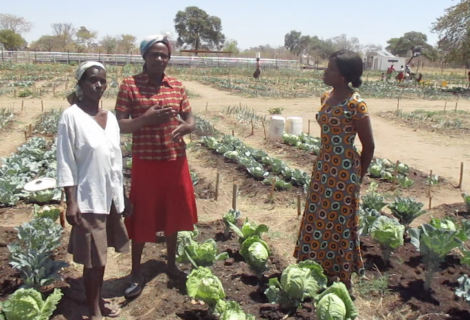Zambezi Valley Resilience Building Programme

Leaving no one behind, a push for social inclusion
By Farisai Madhaka, Gender and Advocacy Officer, Zambezi Valley Alliance
A successful approach to social inclusion should be based on a thorough understanding of the varying needs of women and the youth to create tailored programmes that meet their specific needs. Gender and age play a role in influencing who in a community has access to and control over assets and information. This includes other critical resources and strategies that are necessary for successfully managing shocks, stresses and disasters.
The Crop and Livestock Improvement Centre (CLIC) in Mandimoni in Binga is a clear reflection of how social inclusion is a critical component of the Zimbabwe Resilience Building (ZRBF’s) project objectives. The CLIC includes a pen fattening project that has benefitted the youth and a vegetable garden which helps women to develop proficiency in vegetable cultivation. This in turn helps them become better home and environment managers and meet the needs of their families more easily and economically.
In the Zambezi Valley, the ZRBF programme is being implemented by the Zambezi Valley Alliance where ActionAid Zimbabwe is the lead organization working in partnership with the Zimbabwe Environmental Lawyers Association, (ZELA) and Afrosoft Private Limited. Other ZVA supported districts are Mbire and Kariba which are in the Zambezi Valley. The ZRBF is supported by the Ministry of Lands, Agriculture, Water, Climate and Rural Resettlement, The European Union (EU), the Embassy of Sweden, The United Nations Development Programme (UNDP) and The UK Department for International Development (DFID).
Improving the ability, opportunity, and dignity of those disadvantaged on basis of their identity to take part in society
Nomakhosi Gondwe (18 years) and Senzeni Nyathi (35years) who benefited from the pen fattening project said it opened an avenue to empower youths who are usually excluded from development programmes. Youth are likely to face marginalization due to their membership in excluded demographic groups, including: women, people with disability and economically impoverished. This layered marginalization not only infringes upon the human rights of young people but has negative effects on the cohesion and stability of the societies in which they live.
Senzeni highlighted that youths were disadvantaged by high transport expenses to ferry the cattle to the market and furthermore sold the cattle for RTGs dollars being paid out through Ecocash mobile money transfer which has high charges when one wants to use the money. Because of this they did not make as much money as they had anticipated. The income however was a much-needed capital base for asset building for the youths as some were able to buy goats. Nomakhosi said others used the income to go back to school and re-write subjects they had failed in Ordinary level to give them better prospects for formal employment.
Youths have the potential to drive innovation, entrepreneurship and prosperity. This is needed in the agricultural sector which is deprived of potentially productive, dynamic and innovative agriprenuers. Heterogeneity among youth lies in age differences, young women and men’s backgrounds and the norms defining their abilities and opportunities. Two representatives of Sizimisele Women’s Vegetable group, Nokuthula Nkomo (47years) and Rosemary Mamvura (44 years) said the vegetable gardens assist families with regular consumption of vegetables. The beneficiaries can sell their surplus and earn money which can be spent to purchase other nutritional foods for the family members. Vegetable gardens also help women to establish their dignity in the society as well. Rosemary added that in 2019 she sold some of the produce from the vegetable garden to gain income for her child’s school fees.
Nokuthula Nkomo joined the vegetable group in 2018 at that time their greatest challenge was water as there was only one pipe to water the gardens. The women would at times spend three days without watering the gardens as priority was given to the pen fattening project at the time. In 2019 the water situation changed and there was more water at the CLIC thanks to the ZRBF which has reached 20 young people (10 Male and 10 female) under the pen fattening and 120 young and older women in the vegetable garden at Mandimoni CLIC in Binga. Exclusion of certain gender and age groups from accessing and using resilience capacities because of systemic constraints not only prevents equitable resilience building at an individual and household level, but also reduces the ability of communities to effectively manage risks, impeding longer-term, inclusive development.
The 2030 Agenda for Sustainable Development lays out a map for an inclusive plan of action, pursuing the goal of ‘LEAVING NO ONE BEHIND’ in a way that meets the needs of present generations without compromising the ability of future generations to participate in the processes that impact their lives. Social policies that promote practices based on universal rights-based entitlements, meaningful participation, while paying due respect to diversity and the environment, are more likely to enable social inclusion. Government interventions in the form of enhancement of productive capacities, improved access to quality gender responsive social services, adequate social protection and decent work are crucial to achieving socially inclusive, broad-based and sustainable development.